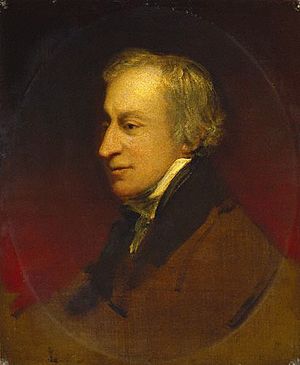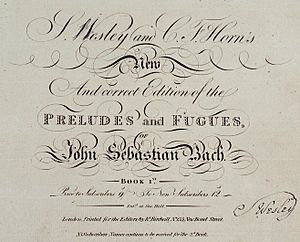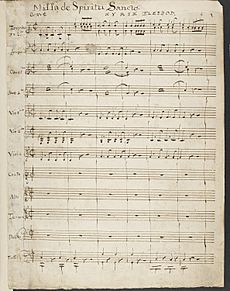Samuel Wesley facts for kids
Quick facts for kids
Samuel Wesley
|
|
|---|---|
 |
|
| Born | 24 February 1766 Bristol South West England
|
| Died | 11 October 1837 (aged 71) |
| Occupation | organist and composer |
| Children | 7 (including Samuel Sebastian Wesley) |
| Parent(s) | Charles Wesley and Sarah Wesley |
Samuel Wesley (born February 24, 1766 – died October 11, 1837) was a talented English organist and composer. He lived during the late Georgian period in England. Some people even called him "the English Mozart" because he was so good at music, just like the famous composer Mozart.
Early Life and Family
Samuel Wesley was born in Bristol, England. His father was Charles Wesley, a well-known leader of the Methodist church and a writer of hymns. Samuel's uncle was John Wesley, who founded the Methodist Church. His family was very musical.
Samuel's first music lessons happened at home in Bristol. His mother, Sarah Wesley, loved to sing and play the harpsichord. The family often enjoyed hymn tunes and music by Handel. Samuel also learned from David Williams, who was the organist at All Saints' Church. In 1778, Samuel moved to London with his family.
Samuel had several children. One of his sons, Samuel Sebastian Wesley (1810–1876), also became a famous organist and composer for cathedrals.
In 1784, Samuel Wesley decided to become a Roman Catholic. This was a big surprise to his uncle, John Wesley, who was a Protestant leader. To celebrate his new faith, Samuel wrote a special piece of music called the Missa de Spiritu Sancto. He dedicated this Mass to Pope Pius VI.
Samuel also joined Freemasonry in 1788. This is a social and charitable organization. Later, in 1812, he became the Grand Organist for a major group of Freemasons in England. He held this important position for five years.
Samuel Wesley passed away in 1837 when he was 71 years old. He was buried in St Marylebone Parish Church in London.
Musical Career and Achievements
Samuel showed his amazing musical skills from a very young age. People recognized him as a child prodigy, meaning he was incredibly talented as a child. His older brother, Charles, was also a gifted musician. Samuel quickly learned to play the violin, harpsichord, and organ. By age eight, he was already known for writing his own music and playing music without needing notes (improvising).
Wesley worked as a conductor, leading musical groups. He also taught music and gave lectures about it. He was one of the first people to give organ concerts in churches in Britain. Before him, people didn't usually think of church buildings as places for entertainment.
Even though he was known as the best organ improviser in England, Samuel never got a permanent job as an organist. He applied for positions at places like the Foundling Hospital and St George's, Hanover Square. However, he faced challenges in getting these jobs. From 1815 onwards, he struggled with money and felt sad. At one point, he even had to ask a friend for simple copying work.
His organ playing was so highly respected that he played for the famous composer Felix Mendelssohn in 1837, just a month before he died. Mendelssohn was very impressed. Wesley, who was very weak by then, told his daughter, "This is amazing playing! Do you think I dare play after this?" Mendelssohn encouraged him to play and praised him. But Wesley humbly replied, "Ah, Sir! you haven't heard me play; you should have heard me forty years ago."

Samuel Wesley played a huge part in making the music of Johann Sebastian Bach popular in England. Around 1810, he worked with Charles Frederick Horn to publish the first English version of Bach's Well-Tempered Clavier. Their efforts helped start an "English Bach awakening," making many other musicians appreciate Bach's genius. Wesley even wrote letters to his friend, Benjamin Jacob, explaining how he helped people understand Bach's music better.
Musical Compositions
Samuel Wesley wrote a lot of music! Here are some of the types of pieces he composed:
- Over 120 pieces for the organ.
- 41 Latin motets (choral pieces) and a cantata (a vocal piece with instruments).
- At least two Masses, which are large musical works for church services. His Missa de Spiritu Sancto was his biggest work, written for singers and a full orchestra.
- 6 symphonies and 4 orchestral overtures (pieces played at the beginning of a larger work).
- 5 organ concertos, 4 violin concertos, and 2 harpsichord concertos. A concerto is a piece for a solo instrument with an orchestra.
- 2 string quartets (for four string instruments).
- Over 65 pieces for the piano (which was often a fortepiano back then). Many of these were fun arrangements of popular tunes. For example, he arranged the Christmas Carol (God Rest Ye Merry, Gentlemen) before 1815, which was the first time that tune appeared in print.
- Many anthems, which are choral pieces for church.
- He also arranged music by other composers, like adapting Bach's organ works so they could be played on English organs of his time.
Many of his most famous works were written for the church, like the motet In exitu Israel. He also wrote secular (non-religious) music, such as the five-part madrigal 'O singe unto mie roundelaie'.
Sadly, much of his music was published and then forgotten. So, it's hard to find copies of some of his works today. A lot of his music still exists only as handwritten notes.
Wesley's music style was a mix of different influences. You can hear sounds from the late Baroque period, the Classical period, and even early Romanticism in his compositions.
 | Charles R. Drew |
 | Benjamin Banneker |
 | Jane C. Wright |
 | Roger Arliner Young |


